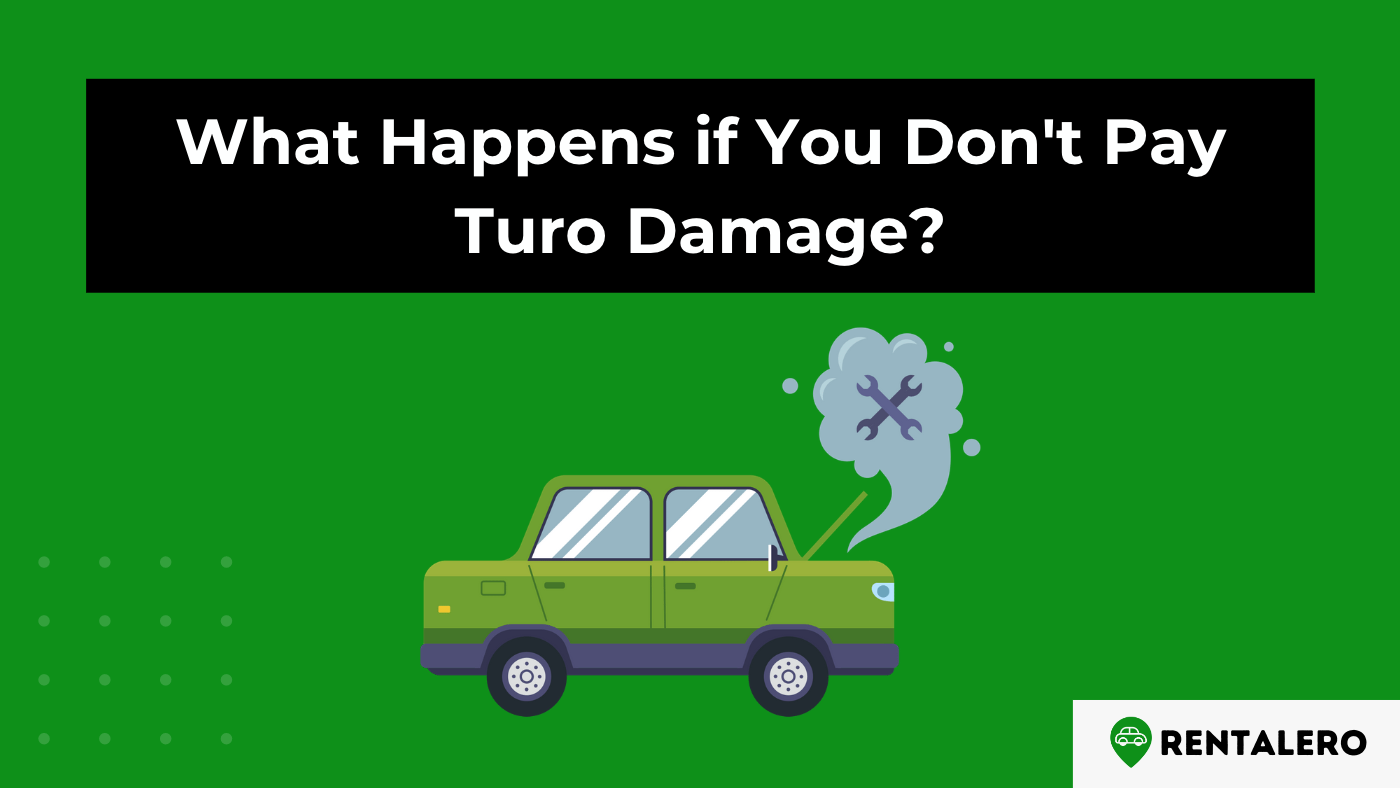Renting a car through Turo can be a game-changer for those who need temporary wheels. However, accidents can happen, and if you’ve caused damage to a rental car, you might wonder, “What happens if I don’t pay for the damage on Turo?”
This article will delve into Turo’s damage policies and the consequences of not paying for damages. By the end, you’ll know how to ensure a smooth and hassle-free Turo experience.
Advertising links are marked with *. We receive a small commission on sales, nothing changes for you.
Key Takeaways
- Turo has a damage policy that outlines the responsibilities of renters and the insurance coverage options available to them.
- Renters who fail to pay for damages incurred during a Turo rental may face financial, legal, and account-related consequences.
- Communication with the car owner and Turo is crucial in addressing damage-related issues during the rental period.
- Renters who can’t afford to pay for damages can explore alternative payment options, such as negotiating with the car owner or Turo or setting up a payment plan.
- Acting responsibly and proactively in addressing damages helps ensure a positive experience for both the renter and car owner, contributing to a more responsible Turo community.
Turo’s Damage Policy
Regarding dealing with damage claims, Turo has a well-defined process to ensure fairness and transparency for renters and car owners.
Here’s a breakdown of the critical steps in Turo’s damage claim process:
Reporting the damage:
Renters must report any damage to the car owner as soon as possible. Ideally, this should be done within 24 hours of the incident or before the end of the rental period, whichever comes first.
Documentation:
Renters should take clear photos of the damaged area and any pre-existing damage already documented at the beginning of the rental period.
Claim submission:
The car owner must submit a damage claim to Turo within 24 hours of the renter’s notification. They should provide all relevant information, including photos and a description of the damage.
Damage assessment:
Turo will assess the claim and determine the appropriate course of action, such as arranging for repairs or reimbursing the car owner for the cost of repairs.
Resolution:
Once Turo has decided, they will inform both the renter and car owner of the outcome. The renter may pay the deductible, depending on their selected insurance coverage.
Consequences of Not Paying for Turo Damages
Failing to pay for damages incurred while renting a car through Turo can have significant consequences for the renter. These can range from financial penalties to legal issues and even the suspension or termination of your Turo account.
Financial consequences (additional fees, penalties, debt collection)
When a renter refuses or neglects to pay for damages, Turo may impose additional fees or penalties to recover the costs. Some of the potential financial consequences include:
Late fees:
If the renter does not pay the deductible or other required fees within the specified timeframe, Turo may charge late fees to encourage prompt payment.
Penalties:
Turo may impose penalties on renters who deliberately avoid or refuse to pay for damages. These penalties can be substantial, depending on the severity of the injury and the renter’s history with Turo.
Debt collection:
If the renter fails to pay the required fees, Turo may resort to debt collection efforts. This can include engaging a third-party debt collection agency to recover the outstanding amount, which may negatively impact the renter’s credit score.
Legal consequences (potential lawsuits)
In some cases, the car owner or Turo may decide to pursue legal action against the renter to recover the costs associated with the damages. Some possible legal consequences include the following:
Small claims court:
The car owner may file a lawsuit in small claims court, seeking compensation for the damages. However, this can result in additional legal fees and a potentially unfavorable judgment for the renter.
Civil lawsuits:
In more severe cases, Turo or the car owner may file a civil lawsuit against the renter. This can lead to a lengthy and costly legal process, with the potential for significant financial liability if the court rules in favor of the plaintiff.
Criminal charges:
In extreme cases, such as when the damage results from reckless driving or other illegal activities, the renter may face criminal charges. This can lead to fines, probation, or even imprisonment, depending on the severity of the offense.
Impact on Turo account (suspension, termination)
Not paying for Turo damages can also seriously affect your account with the platform. As a result, Turo may take the following actions to penalize non-compliant renters:
Account suspension:
As a first step, Turo may temporarily suspend the renter’s account until the outstanding fees are paid. Unfortunately, this means the renter cannot rent cars through Turo until the issue is resolved.
Account termination:
If the renter ignores their financial obligations, Turo may permanently terminate the account. This can be a significant setback for those relying on Turo for car rentals, as they must find alternative rental options.
Negative reviews:
Unresolved damage claims can lead to negative reviews from car owners, impacting a renter’s reputation on Turo and making it more difficult to secure future rentals.
Steps to Take If You Can’t Afford to Pay for Damages
Suppose you find yourself in a situation where you can’t afford to pay for damages incurred during your Turo rental.
In that case, it’s essential to be proactive and communicate your concerns with both the car owner and Turo.
In this section, we’ll outline the steps you can take to resolve the issue and potentially avoid some of the adverse consequences discussed earlier.
Communicating with the car owner and Turo
Open and honest communication is crucial when dealing with an inability to pay for damages. Here are some tips for discussing the issue with the car owner and Turo:
Be upfront:
As soon as you realize you cannot afford to pay for the damages, inform the car owner and Turo about your financial situation.
This can help prevent misunderstandings and foster a cooperative atmosphere.
Provide documentation:
Offer any relevant documentation that supports your claim of financial hardship, such as pay stubs, bank statements, or other proof of income and expenses.
Exploring alternative payment options (payment plans, negotiating)
If you can’t afford to pay for damages upfront, you may be able to arrange alternative payment arrangements with the car owner and Turo.
Consider the following options:
Payment plans:
Request the possibility of setting up a payment plan to spread the cost of the damages over a more extended period.
This can make the financial burden more manageable but agree on a payment schedule that you can realistically commit to.
Negotiating:
Suppose the car owner is willing to negotiate. In that case, you may be able to agree on a reduced amount or alternative form of compensation (such as providing services or goods in exchange for covering the cost of damages).
Be prepared to make a fair offer and maintain a collaborative mindset during negotiations.
Turo’s assistance:
In some cases, Turo may help facilitate a resolution between the renter and the car owner. Contact Turo’s customer support team to discuss your situation and explore available options.
Seeking legal advice if necessary.
If you’re unable to reach an agreement with the car owner or Turo, or if you’re facing legal action due to the damages, it may be necessary to seek legal advice. Here are some steps to consider:
Consult with an attorney:
Speak with a lawyer who specializes in personal injury or property damage cases. They can help you understand your rights and responsibilities and provide guidance on the best course of action.
Legal aid organizations:
If you cannot afford to hire an attorney, you may be eligible for assistance from a legal aid organization. These organizations provide free or low-cost legal services to those who qualify based on income and other criteria.
Document everything:
Keep detailed records of all communications and agreements related to the damages and your efforts to resolve the issue. This documentation may be crucial if your case goes to court.
Conclusion
Following Turo’s guidelines, communicating openly with car owners and Turo, and being proactive in addressing any damage-related issues can help ensure a positive experience for you and the car owner. By doing so, you’ll avoid the potential financial, legal, and account-related consequences and contribute to a more responsible and enjoyable Turo community.
Frequently Asked Questions
Can I negotiate with the car owner or Turo if I can’t afford to pay for damages?
Yes, you can try to negotiate with the car owner and Turo if you cannot afford the damages.
When should I seek legal advice regarding Turo’s damages?
If you’re unable to reach an agreement with the car owner or Turo, or if you’re facing legal action as a result of the damages, it may be necessary to seek legal advice.
What should I do if I notice damage to the car before my Turo rental begins?
If you notice any pre-existing damage before your rental begins, document the damage with photos and notify the car owner and Turo immediately. This will help ensure you are not held responsible for any pre-existing damage.

Nzoputa has been writing for Rentalero since day one and is one of our most experienced members when it comes to the rental industry. For her, nothing beats Uber!
Advertising links are marked with *. We receive a small commission on sales, nothing changes for you.

